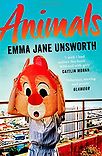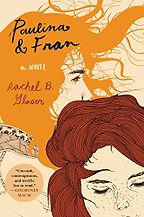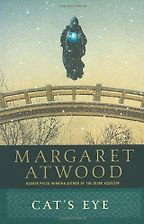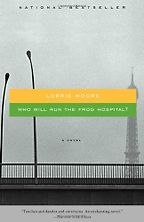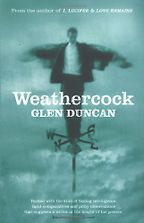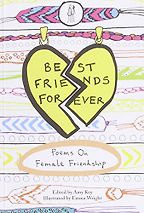Your novel Animals focusses on the friendship of two women, Laura and Tyler. What is it about friendships that you find interesting?
I am as deeply affected by friendship and platonic love in books as I am by romance. That is probably why I wrote what I wrote. I think there is the capacity in friendship for that deepest emotion and it doesn’t have to be about sex. At the same time it’s interesting to question the sexuality within all human relationships because it’s never cut-and-dried. The books I have chosen, and the books that have meant so much to me in terms of inspiration, and philosophical development, question the nature of human interaction at all levels, because it’s never straightforward.
My favourite characterisation of friendship is in Jane Austen, in Emma. The narrator says that, around her friend Mrs Weston, Emma feels “always interesting and always intelligible.” Can you think of a way of describing friendship?
I don’t know if I can beat Jane Austen. “Interesting and intelligible,” it has the idea of someone being fascinating, but also brings to mind a cosiness. I think that would play out in some of the poems in the collection I’ve chosen. But I think in the other books I’ve chosen there are much more difficult friendships, where it’s more about destruction and the wake of a destructive friendship. Even though the people in them aren’t villains necessarily, what they do to themselves because of what they were seeking in that friendship is not always the best thing for them.
“We prize romance or romantic love more highly than friendship: morally, financially, in every way.”
Quite often in these books the stories are narrated from two points of view. The character’s an adolescent, and the narrator’s a middle-aged women who’s reflecting on this period of adolescence when she had this intense friendship—on the way it’s affected her whole life and personality since then. It happens in Cat’s Eye, and to a certain extent in Paulina and Fran, although they’re not middle-aged at the end, there is that sense of aftermath and of looking back and assessing the damage and looking at the war-wounds of this friendship. That also happens in Who Will Run the Frog Hospital?
Do you think then that friendship novels are often also break-up novels, whereas romantic novels are about beginnings?
I don’t know. I think there are as many romantic novels that are also about heartbreak and disaster. But I think the books about friendship don’t get as much airtime as the books about romance because I think we prize romance or romantic love more highly: morally, financially, in every way. We have all these markers and milestones—like engagement, like marriage—which give status. There’s nothing like that in friendship, there are no anniversaries, apart from the painful ones that you sometimes have to go through yourself when you revisit an old haunt.
Your first book is Paulina and Fran by Rachel B Glaser. Why did you choose it?
This book comes out in the UK in January with Granta and it’s already out in the US. It blew me away. It’s about two art students—Paulina and Fran—Paulina is very caustic, very sharp-tongued, and Fran is more ethereal, more of a Kate Bush figure. They’re really drawn to each other in a way that you sense a danger in from the off.
It’s a really brilliant satire in many ways, on the art world and on art school. There’s a great bit near the beginning where an artist comes to talk to the class. It says the artist put a curse on them before she left, saying, “Only one of you will make it in the art world,” which is the kind of thing you get told on creative writing classes. It’s a very scathing book, razor-sharp, and no-one really escapes. It’s a brutal exploration of female friendship. I loved it, and I loved where she goes with the characters, and she really delves when she’s exploring them. It deals with the sexuality of Paulina and Fran, not only with the men they come into contact with, and have relationships with, but in terms of what they think of each other and why they’re attracted to each other.
The idea of the doppelganger is something that comes up in this book. There’s a terrifying kernel within recognising kinship with someone. While they can understand you and you can understand them there’s a beauty in that, and a loveliness in being seen for who you really are; but there’s also a terror, because if somebody knows you, then they can destroy you. Understanding combined with potential destruction is at the heart of this book.
There’s sadness as well as the girls leave college and enter the disappointing adult world and everything is mediocre and there isn’t that same invigorating connection around every corner that there is when they’re at college. They have to make sacrifices of self and of longing and of desire. That resignation is a great tragedy in this book and really well-explored and the ending—I won’t give it away—will savage you. It’s so brilliant and sad, and perfect. I think Rachel B Glaser is a stylist, and I love stylists. There’s a beautiful rhythm to her sentences and real originality to her jokes and to her observations. I think it’s a bold, brazen, dark and dirty book.
There’s a book called Eat My Heart Out by Zoe Pilger, which has quite a few similarities with this one. The heart of it is a friendship, in many ways, between the main character and an older feminist. It’s a satire on feminism and the same kind of almost deceitful narration that’s also very thrilling is there in both books. When you’re reading them you feel like you’re sticking your hand in a bag of snakes. You’re going to do it, you’re not going to woose out, but there’s that kind of treachery afoot in both of these books.
I was thinking earlier, do I have a relationship with books like this that is like a destructive friendship? I’m compelled to keep going back.
The book focusses on some—what you might call—superficial details, such as hair, or even female friendship itself. Why do you think female writers are still having to argue that these things can be profound?
I guess because we’re generally disrespected, and our looks are commented on so much and we’re always asked where our dress is from and when we’re going to have a baby. So while those questions keep coming we’re going to have to keep ripping the piss out of such things in our writing. Rachel B Glaser writes about hair, but is completely satirising our obsession with it. She is also being 100% sincere.
In the Atwood, there’s a section where the protagonist Elaine is interviewed by a journalist as to whether she’s a feminist painter, and she angrily gets around that because she feels the way she’s being questioned is really cynical. I think getting angry and being funny are the answers to this.
This is Margaret Atwood’s Cat’s Eye. Tell me about this book.
This is the story of “frenemies”—sorry to use that word. Elaine is our protagonist and she’s a painter and she’s middle-aged. She’s going back to Toronto forty years after she grew up there. She is haunted by memories, and specifically one girl from the past: Cordelia. While she’s in Toronto, memory is used as a narrative tool to take us back to these episodes of childhood, when Elaine was very young and looking for a friend. She wants to be with the girls, and to do what the girls are doing. Cordelia, unfortunately, is a complete bully and a sadist and tortures Elaine in many ways. The whole thing builds to a damaging, destructive, horrible experience, that even forty years on Elaine hasn’t shaken. It’s still very fresh and raw. It’s ultimately so sad, but what stops it wallowing in despair is Atwood’s writing. You think “how can you get meaning and, wit, and wisdom in every sentence?” It should be too rich to read, but it isn’t: she’s a great chef with words, even though she’d probably hate that description. She balances it all perfectly. It’s inspiring and off-putting at the same time.
I read an interview with Atwood recently where she said feminism’s main job at the moment is to tackle male violence. I think that is true, that and equal pay. But within this book—published in 1988—she looks at the way women look and are forced to look. That’s the focus when Elaine is growing up and searching for a way to be a correct-looking female. Atwood explores how gender stereotyping is set up physically and in terms of beauty and what’s feminine and pretty and attractive to men. Even the all-powerful, mighty, bully figure of Cordelia doesn’t escape that. She might be a bully in the female hierarchy of this book, but in the bigger picture—against men—she’s as disempowered and without agency as most women.
Many of these friendships seem to be in opposition to destructive relationships with men. I wondered how much of a sanctuary that relationship with a woman is?
I’m very interested in the cusp of adulthood for women. I think all these writers are too. They’re looking at adolescence—or protracted adolescence, if you’re looking at college years. You have a great mix of feelings, of potency and agency, especially for women. When you start having your periods, you can literally have the world inside you, and the future inside you. You have all that sense of power and wonder, but you’re terrified because you know you’re moving into a world that’s run by men and you’re going to be crushed from the outside. It’s that mixture of vulnerability and power that I think is so interesting. Maybe the characters that I’ve explored have recognised that their intense friendships with women would give them a side-road away from having to fulfil social expectations. I believe that in that period of burgeoning sexuality teenagers find a place to channel all that fire and fury that is also a safe place. Quite often teenage girls will chose a popstar, or a teacher, someone they can’t actually have a physical relationship with, because that physical reality immediately restricts you.
For married women in these books, it seems friendships remain important, but they’re no longer that escape they once were.
In the Lorrie Moore, the central character has got married, she’s with her husband now and so from the outside that’s all right and proper. But actually there’s a distance between her and her husband and she’s very much hankering for the past and for the intensity of this relationship with a friend that she had that’s never been bettered and that she can’t replicate.
Is that because we lose innocence? Is that because we lose hope? Or is it because we lose the capacity to connect that deeply once we become jaded, or a bit world-worn? Or we think more about ourselves, or we focus on other things—like our career—or we start worrying about money? All these other things come in that take us away from our most primal urges. I don’t know whether that’s a good thing or a bad thing.
Tell me about Who Will Run the Frog Hospital?
I love Lorrie Moore. She’s very well-known in America, more so than in the UK, sadly, but that’s changing. She’s primarily known for short stories, of which she is a master. This is her second novel. It’s about a woman—Berie—who’s on holiday in Paris—she’s from upstate New York—with her husband Daniel. It’s not a great relationship, it’s not a great marriage. He’s pushed her down the stairs a few weeks prior to their holiday and she’s hurt her hip. She’s not happy. There’s a distance between them, and it’s this distance that allows her mind to move to the past and to think about this friendship she had as an adolescent with a girl called Sils. They were working together at an amusement park called Storyland. While they were there they rescued frogs from horrible teenage boys—hence the title, which also comes from a painting by Nancy Mladenoff. But then Sils starts dating Mike, who has a motorcycle, and she gets pregnant and distance comes between them, and their friendship is essentially ruined by this. Then Berie goes to boarding school and does very well academically, which surprises her. Their lives grow apart. There’s a High-School reunion, but by then there is too much distance between them. They’ve lost that initial connection.
Get the weekly Five Books newsletter
Since then Berie has experienced a whole load of shit at the hands of people, and the world, and a man, and has become a different person. She has shut down part of herself. She tries to make friends with a woman in Paris—an artist called Marguerite—because she’s craving intimacy so much, and craving that connection. But she just can’t do it. There’s a real sense of loss there. It’s about these two timelines and the gap between them, and this sense of tragedy and intensity that comes from having a very close adolescent friendship.
One of the reasons I love Lorrie Moore so much, is that she really captures the way people think, which is a major goal for me. She can really get inside the heads of her characters.
This book talks about the great potential you feel when you’re an adolescent. In these books the outcomes for both friends seem to be quite unequal, and that reflects inversely the power they have in the friendship.
I think that sense of rivalry is key to all of these relationships, that sense of competition and of battle. Firstly jostling for each other’s attention, then for who has the upper hand in the relationship. That doesn’t go away, then sooner or later one of them is going to be given something by society—a job, academic success, a husband—that gives them status that the other one doesn’t have.
It’s like the Morrisey line “We hate it when our friends become successful,” there’s that sense of betrayal when someone hasn’t stayed down with you. It’s especially compounded when you think their movement upwards is through a false, socially constructed strata.
Your next choice is Glen Duncan’s Weathercock.
This is a bildungsroman about the young life of a character called Dominic Hood. He has a kinship at school with friends, in particular with two friends called Pen and Kelp. But he’s also literally haunted by the ghost of a dead friend from the past. We hear him as the older man reflecting. We realise that—in the same way that Elaine is haunted by Cordelia—this is a literal ghost. That surreal aspect is one of the things I love about Duncan’s work.
The character, Dominic Hood, a little later in life is attracted to a girl called Deborah Black, with whom he does some pretty sadistic things, which really plumb the depths of morality. I think that’s why Duncan has been such a huge influence on my work. He has made me braver as a writer. He writes a lot about sex, and a lot about the darker aspects of human nature. He goes where few other writers—and thinkers—will go. It’s really brave, what he writes about. And it’s made me braver.
Aside from that I think he’s fantastically funny. Glen’s style is very self-conscious and very playful. He’s a stylist, like Rachel B Glaser, and I think there’s so much to admire in that. That kind of writing gets accused of being overwrought, or over-written. But I like a sentence that twists and turns, and I really like it when I can tell that an author has really tried to capture the meaning of what they’re saying. I think you can tell when a sentence has been worked at, and I appreciate that. There’s that Orwell quote, that good writing should be like a pane of glass, you shouldn’t notice it. But I like stuff where you can really see the sweat in the words.
“It baffles me there isn’t more sex in books.”
I think Weathercock is his best book. It’s huge, about 500 pages, but it doesn’t feel like that because it’s so lively in style. It explores different relationships, but essentially looks at the theme of kinship—that so many of these books touch on—that idea of a connection between people, for good or bad, that deep connection that tells you someone has got the same essence as you. It can be simultaneously thrilling and unnerving and comforting. But I think Glen Duncan captures that. He writes about sex and about smells, he’s very visceral as a writer. I like that because it baffles me there isn’t more sex in books, and that there aren’t more descriptions of physicality and the way, as humans, we do smell of certain things and we’ve got all sorts of stuff going on in our bodies. I don’t find it repulsive and I think it’s important for female characters to exhibit those and for them to be seen as normal functions.
I think within this book you get a real comparison between what friendship gives you and what sexual encounters can give you.
Your last book is a poetry anthology Best Friends Forever, edited by Amy Key. Tell me about this book.
This is a beautiful, slim volume, published by the Emma Press: they’re a wonderful, small press. It’s a selection of contemporary female poets writing about the complexities of female friendship, everything from enchantment to destruction. There’s a huge array of the different feelings, the different beginnings a friendship can have, the different things it can do to you and the different aftermaths it can have. It covers a great breadth.
There’s a lot of comedy in it too. There’s a poem called Will You Be My Friend, Kate Moss? by Kathryn Maris about a woman whose daughter is in the same ballet class as Kate Moss’s daughter, and she dreams up this whole scenario where they could be best friends, if she just talked to her.
I chose this because it’s a lovely thing, but also because poetry is so important for me, for inspiration while I’m writing. I don’t tend to read novels when I’m writing a novel. I read poetry, as I do that quicker, I can get more of a quick fix and get ploughing on with however many pages of the novel. Poetry then literally ends up playing a part in my work. Yeats is a huge factor in Animals. But others as well, Anne Sexton’s in there, John Cooper Clarke.
Amy Key, in the introduction, says she put the anthology together because she felt female friendship wasn’t a subject that was well-represented in poetry. She did a survey on Twitter asking people what their favourite poem about friendship was. A lot of people chose poems by men, and the subjects of the poems were camaraderie, war, brotherhood, or intellectual rivalry. So she thought it was time to put together an anthology that looked at the nuances of female friendship. The breadth of intimacies and experiences they cover is vast and beautiful, and a testament to what female friendship can do in your life, and friendship of all kinds.
There’s a section called We all have our choice of sisters and I thought, “Do we?” Because in the books I’ve chosen, there’s almost a compulsion and an irresistible attraction of the protagonist for these people who are in some way going to ruin their lives. So I thought, “Maybe we don’t get to choose quite so freely.”
Five Books aims to keep its book recommendations and interviews up to date. If you are the interviewee and would like to update your choice of books (or even just what you say about them) please email us at [email protected]
Five Books interviews are expensive to produce. If you've enjoyed this interview, please support us by donating a small amount.

